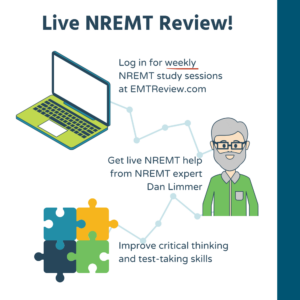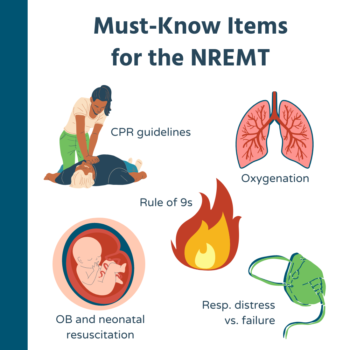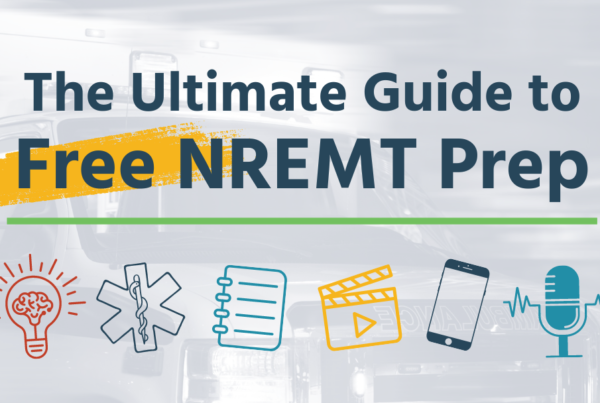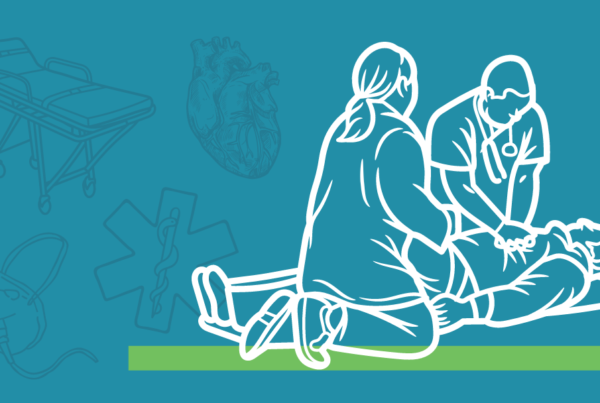There is nothing easy about the NREMT or about the preparation required to pass it. People who think the exam was easy usually think that because they were really well prepared for it.
However! There are some things you can do before and during the NREMT to improve your chances of passing, even if you’re shaky on some topics. If you know the material and understand how the test works, these can be just enough to push you from near-passing to passing.
Know the Must-Know NREMT Items
Below we’ve got some test-taking tricks and strategies to help you if you get stumped during the exam. But no matter how many testing tricks you have up your sleeve, you will fail the NREMT if you don’t know these things:
- CPR guidelines
- Respiratory distress vs. respiratory failure
- Oxygenation
- Rule of 9s
- Obstetrics and neonatal resuscitation (Some people get lucky and don’t have a lot of these questions… but don’t bet on being one of the lucky few. Study your special populations!)
Divide Your Study Time Across All Topics
This may seem obvious, but people tend to spend their time on the topics that most interest them… meaning other topics get neglected. Love trauma but hate operations? Probably means you need to spend more time with operations.
To pass the NREMT at the EMT level, you have to pass each section: airway, cardiology & resuscitation, trauma, medical, and operations. If you knock four of those out of the park but bomb the fifth, sorry, you’re not passing.
So give yourself plenty of time with each subject. In a perfect world, you’ll have at least a week for each topic. But if your NREMT is less than 5 weeks away and you haven’t started studying, it’s OK, you can shorten that time.
Need help getting organized? EMTReview.com is a comprehensive test prep site that offers EMT and paramedic users 5-part guides of what to study and how to study it. The weekly study guides will help you make the most of the site in the time that you have left, and keep you focused on the info that matters most for the NREMT.
Don’t Try to Memorize Every Medical Term in Existence
Knowledge of medical terms and conditions is important and necessary, but you’re just not going to know every single word in the medical dictionary. Don’t waste valuable study time trying to memorize them all.
What should you do when you see an unfamiliar term on an NREMT question? Here’s our better-than-guessing process:
- Don’t let it stress you out.
- If the word you don’t know is in the question stem, read the stem without that word. Look for important things like patient criticality or urgent situations. Then look for an answer choice that best matches what you know about the scenario.
- If the word you don’t know is in one of the answer choices, look at all the other answers. If they’re all wrong, then maybe the answer with the foreign term is correct. Or, if there’s one answer that seems right, go with that one.
It’s not a magic formula, but again, it’s better than guessing.
Come to Dan’s Weekly NREMT Review
 This is our #1 recommendation to make exam prep as painless as possible. Dan’s Weekly Review is a live, online study session guided by EMS author, educator and paramedic, Dan Limmer. Every week, there are brand new practice scenarios and topics. Make the most of the opportunity and ask him every question you have.
This is our #1 recommendation to make exam prep as painless as possible. Dan’s Weekly Review is a live, online study session guided by EMS author, educator and paramedic, Dan Limmer. Every week, there are brand new practice scenarios and topics. Make the most of the opportunity and ask him every question you have.
These study sessions happen weekly. Days and times vary to accommodate a variety of schedules.
Dan’s weekly NREMT review is available with a subscription to EMTReview.com. Membership is $24.99 for a month. It’s easily one of the most affordable options out there, and there’s nothing else like this Weekly Review.
When You’re Lost on an NREMT Question, Do This
You’ll probably get questions on the NREMT where you don’t even know how to begin narrowing down the answer choices. What should you do? Ignore the stuff you don’t understand and look for what you DO know. For example, if the patient is breathing shallowly, the answer may be to ventilate the patient; the part you don’t know may not matter. Also, look for parts of words that may make a difference. Broncho- refers to the lungs or bronchioles, hemo- refers to blood, etc. See if that narrows down possible answers. Use every scrap of information you can to make a more informed guess at the answer.
Also, don’t let these questions shake your confidence. Maybe you’re doing really well on the exam so the computer is serving you difficult items. Maybe you’re seeing pilot questions – i.e., questions the Registry is just trying out that don’t actually count toward your results. Or sure, maybe you just missed an area of study. Whatever the case, don’t let it shake you. Do your best and move on.
Don’t Stress Over the NREMT
If we can leave you with one final bit of advice, it’s this: Believe you can do it. Instead of worrying over every detail, do your best on each question, pat yourself on the back, and move on to the next question. Don’t fret over the questions you already answered. Don’t fret over the questions that might be coming. You’re much less likely to make mistakes if you breathe, relax your shoulders, and focus only on the current question.
Good luck!



